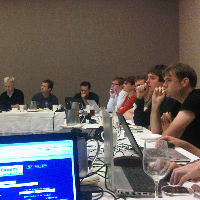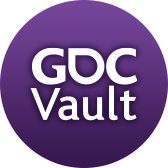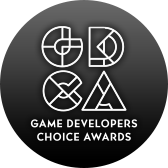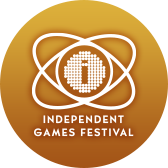[As Game Developers Conference approaches its 25th anniversary next February, a series of posts will give insight into the process and history behind the show. This time, organizers take a look at the Main Conference submission process, as first-round acceptances are sent out.]
Although there's still plenty going on around other GDC shows -- with GDC Online taking place in a couple of weeks and GDC China still on the agenda for December, organizers are well into the process of picking talks for GDC 2011.
The 25th annual Game Developers Conference -- celebrating a quarter-century of existence giving inspiration and practical take-away by developers for developers, is being held in San Francisco's Moscone Center next February 28 through March 4, 2011.
Last year, then-board member Simon Carless discussed the background of how talks get picked for GDC, explaining at the time:
"One initial point that is worth making strongly. I know that in some conferences (both outside the game industry and in), the Advisory Board can take a much smaller role in actually directly picking the content.
But one of the reasons that Game Developers Conference is so well respected, I believe, is that all of the talks are either empirically chosen from submissions, or carefully and specifically invited by the official GDC Advisory Board. The GDC organizers don't pick your talk -- key members of your own peer group pick your talk.
So rather than being hands-off 'advisors', multiple Advisory Board members grade every single submitted talk. They also discuss submitted and invited talk specifics via email, phone, and during the course of multiple in-person meetings. Finally, they coach and mold conditionally accepted GDC talks into a better end product."
We're doing the same this year, and after submissions that ended in August, GDC 2011 lecture selection has again been extremely competitive -- with more than 800 submitters vying for the opportunity to present at the next Game Developers Conference.
And we continue to be very serious about the review process for GDC talks. This year, 5,555 ratings/internal comments were made on potential GDC 2011 talks by the Advisory Board. The Board (pictured above) includes senior developers and execs from most of the major companies in the business, from Blizzard through Bungie to Playdom and beyond. They then gathered in-person for an intensive weekend of meetings in Silicon Valley last month to decide which talks made it.
As you may have seen on Twitter and elsewhere over the past couple of days, rejections and Stage 2 acceptances have been going out. Following some of this feedback, we decided to take another look at how we communicate to you, if your talk didn't make it to the next round. We're going to try to give more constructive generalized comments, going forward, since we realize that some of our rejection letter phrasing might appear unhelpful.
Unfortunately, part of the issue is that we can't comment on why individual submissions were accepted or rejected, due to the massive amount of submissions and the complexity of the process. But GDC submitters should be aware that rejections are often due to multiple reasons -- many of which have nothing to do with the professionalism or quality of the talk submitted.
Either a narrower subject matter area and competing submissions falling within the same focused topic may mean that the GDC Advisory Board can't approve every talk that may otherwise pass muster for the show, given the venue's limited time and space for talks.
However, we've now compiled several constructive comments that we feel reflect how the GDC Advisory Board sees submissions, and we'll be sending them out to all unsuccessful submitters going forward:
- Although the first phase GDC submission gives you limited space, how well did you get to the meat of what is being discussed? If you can be very specific on the kind of practical, real-world facts and take-aways that GDC attendees will get from your talk, the Board will appreciate your submission all the more.
- The Board is keen to get talks that are focused, but it's worth considering how many members of the GDC audience will get direct take-aways from your talk. For example, if your presentation on glider aerodynamic simulators only has concrete lessons for people working on hardcore glider sims, then the Board may consider that not enough attendees will benefit from it, technically excellent though it may be.
- Obviously, it's best if you submit something based around a topic for which you are a proven practitioner or success, with relevant industry history. Say you've been making acclaimed RPG titles but you're very excited about your new FPS that hasn't yet launched. Although you may be excited about your FPS, a talk about lessons from those successful RPGs may be more to the Board's liking.
- If you've previously spoken at GDC, be aware of what your evaluation score(s) were, the comments from attendees, and try to address those in your new submission. The Board will look at previous ratings and comments and consider whether your submission might address those.
- If you're submitting a panel session, the full list of participants and their background/suitability will greatly increase the chances of the Advisory Board being interested in hearing more about it.
So, our commiserations to the folks that didn't make it to the next round -- and we hope you'll consider submitting again, or even submitting a submarket-specific talk to the GDC Summits process, for which the submission process is now open.
Rest assured that your talk was taken seriously and reviewed in depth by each discipline-specific part of the board. So for programmers, for example, top developers from CCP, Bungie, EA2D and other studios did review and comment in a specially-made talk rating system, plus debated many of your submissions in-person.
And for the approximately 15 percent of submitters whose proposal made it through, we now want to see a "substantially complete presentation" -- including the gist of their talk in text form, with additional slides and videos if necessary. We will now work with those submitters and the Advisory Board to hone the talk to provide maximum value and takeaway for the GDC audience -- and we do accept the significant majority, but not all of the talks that make it to this stage. And roll on February!



